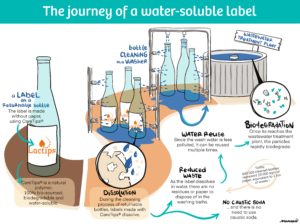The reintroduction of glass bottle deposits comes at a time when promoting the circular economy is necessary, all while limiting the use of single-use containers. This initiative aligns with sustainability goals and aims to reduce our environmental footprint, while emphasizing the many benefits of reuse.
Reusing glass containers requires less energy than recycling glass. Indeed, the production of recycled glass involves extremely high temperatures for melting the material, which is a highly energy-intensive process. Promoting reuse helps to minimize this energetic demand, thereby reducing our carbon footprint. When it comes to water, glass manufacturing is once again very water-intensive, and reuse drastically reduces this demand, contributing to the conservation of this increasingly precious resource.
However, reusing containers does require the ability to clean them. Washing stations, once more numerous in France, are now experiencing a renewed interest from the industrial field and investors. The major challenge these stations currently face is the presence of labels that persist on certain containers, despite an extended soaking time, making them ineligible for cleaning and, consequently, for reuse.
What is Lactips’ solution?
Lactips offers an innovative solution to this challenge, thanks to the water-soluble label made with its material: CareTips®. This material, 100% bio-sourced, biodegradable and water-soluble, is transformed into a printable adhesive film. The resulting label contains no paper.
When the glass container arrives at the washing station, the label dissolves very quickly upon contact with water, leaving no residue or microplastics. The washing water is then less polluted and can be reused for a higher number of cycles before being replaced. Finally, the label will completely biodegrade once it reaches the wastewater treatment plant, with no impact on the subsequent water cycle.



